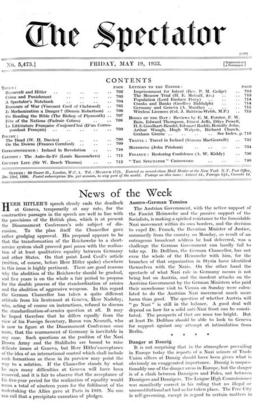News of the Week
HERR HITLER'S speech clearly ends the deadlock at Geneva, temporarily at any rate, for the constructive passages in the speech are well -in line with the provisions -of the British plan, which is at present the Disarmament Conference's sole subject of dis- cussion. To the plan itself the Chancellor gave rather grudging approval. His proposal appears to be that the transformation of the Reichswehr to a short- service system 'shall proceed pan passu with the realiza- tion of at least qualitative equality between Germany and other States. On that point Lord Cecil's article (written, of course, before Herr Hitler spoke) elsewhere in this issue -is highly pertinent. There are good reasons why the abolition of the Reichswehr should be gradual, and five years is on the whole a fair period to propose for the double process of the standardization of armies and the abolition of aggressive weapons. In this regard the German Chancellor has taken a quite different attitude from his lieutenant at Geneva, Herr Nadolny, who, acting of course on instructions, refused to discuss the standardization-of-armies question at all. It may be hoped therefore that he differs equally from the view of his Foreign Secretary, Baron von Neurath, who is now to figure at the Disarmament Conference once more, that the rearmament of Germany is inevitable in any case. Such questions as the position of the Nazi Brown Army and the Stahlhelm are bound to raise delicate issues at Geneva, but Herr Hitler's acceptance of the idea of an international control which shall include such formations as these in its purview may point the way to a solution. If the Chancellor stands by what he says many difficulties at Geneva will have been removed, and it is fair to observe that the acceptance of his five-year period for the realization of equality would mean a total of nineteen years for the fulfilment of the undertaking the Allies gave at Paris in 1919. No one can call that a precipitate execution of pledges.














































